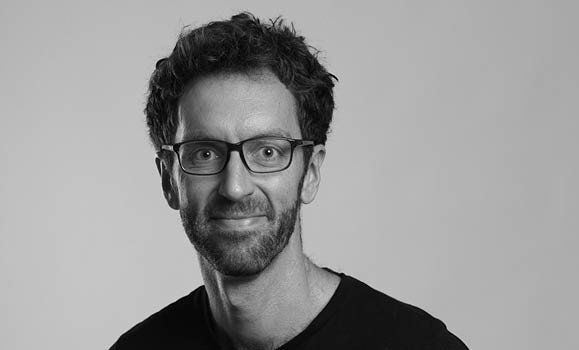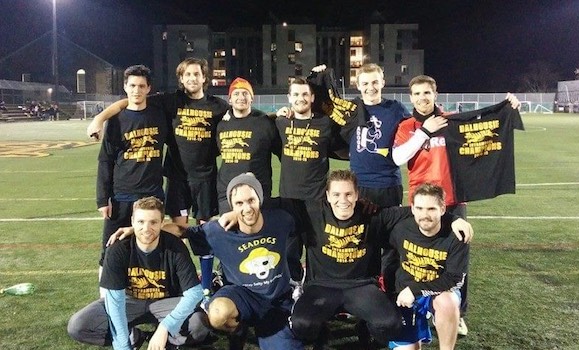Sciographies is a radio show and podcast about the people who make science happen, presented by The Faculty of Science and campus-community radio station CKDU 88.1 FM. This is the eighth and final article in a series that featured excerpts from each new episode released throughout the fall.
Will Burt’s (PhD’15) legacy within the walls of ±«Óătv’s Department of Oceanography may have nothing to do with the fact that he’s currently pioneering an ocean-focused climate solution. Instead, Dr. Burt is recognized as a founder of Seadogs, the department’s intramural team, so much so that someone has even displayed his #2 jersey in the student lounge.
From 2009-2015, Dr. Burt was here at Dal working on his doctorate in chemical oceanography (and “playing a lot of Seadogs soccer”). Today, he’s the Chief Ocean Scientist at , a carbon dioxide removal company headquartered in Nova Scotia. The company partners with Dal researchers to study the efficacy and safety of ocean alkalinity enhancement (OAE), a mitigation approach that harnesses the ocean’s natural ability to capture and store CO2 from the atmosphere.
This special alumni episode, done in partnership with Dal’s series, is the final episode of Sciographies’ fifth season. Host David Barclay interviews Dr. Burt about discovering a passion for oceanography, leaving a tenure-track position in academia to work in industry, and what it’s like to be on the frontlines fighting climate change.
Listen to a preview of Dr. Burt’s episode
Ěý
Here are some excerpts from the episode, edited for clarity and length.
A defining experience
Barclay: [Going to university] was a family given. But the discipline — did you know what you wanted to study as soon as you arrived, or was that a process of finding yourself?
Burt: I definitely wasn’t a budding oceanographer. When I started, I knew I wanted to do science and I knew I wanted to do an environmental science. I was always better at chemistry than both biology and physics. I ended up in geology my whole [undergraduate] degree, essentially… Big fan of the field work stuff. But I was really bad at mineral identification. Even worse at understanding the formations. So, I was never super passionate about it. My stepfather was an oceanographer and he told me about his Arctic fieldwork and these super cool stories about going all around the world to study oceanography. I was pretty excited about that and so in third year he got me an interview to go on an icebreaker, the Louis S. St-Laurent in 2005. I went for five weeks in the Beaufort Sea collecting water samples and that was the shifting point for me in terms of career choice.
A promising solution
Barclay: Can you tell us a little bit about ocean alkalinity enhancement — what the objectives are, what the pitch is?
Burt: We're accelerating the Earth's natural process of taking up CO2 and storing it in the ocean. And because the oceans are by far the biggest reservoir of carbon on the earth's surface, the oceans are the place to store all this carbon we've put in the atmosphere… This natural process happens because rain falls on rocks, dissolves those rocks, and those rocks end up in rivers and oceans. The dissolved rock is alkaline, so that’s a natural alkalinity delivery process that has completely shaped our climate for millions of years. If we can just do that faster, artificially deliver more alkaline rock to the ocean, it will naturally take up more CO2…
If [OAE] is deployed on a big, big, big scale, you could start making a dent. It's really important to stress the fact that it would be a dent. [OAE] is not a silver bullet, it's one of many solutions that could help — all of which are completely useless without emissions reduction. But on top of that, we need to take some of the CO2 out that's already there [in the atmosphere] if we want to stand any chance of avoiding the worst impacts of climate change.
Forging on
Barclay: Do you feel like you’re on the frontlines of climate change?
Burt: We're on the front lines of climate solutions. 2023 has been a challenging year for me because we're going out there now and doing this, and I've had a lot of people push back on it. I don't take that stuff super well because I'm a fairly emotional person… I'm not going to pretend I’m a trailblazer of the world, but trailblazing ocean alkalinity enhancement, I think, is a fair statement. And there's a reason they call it trailblazing — it's really hard. I've had some tough moments this year, but I’m so into it now. I'm just so motivated. And, you know, it may turn out that ocean alkalinity is not the solution. And I hope we find that out soon so we can move on to something else. But, so far, it's going great. And because it's got the scalable part to it, if we can succeed and if we can make something of this, it could be a pretty big deal.
Dr. Burt with the Seadogs pictured in Wickwire Field, 2014. (Provided image)
Listen to the entire episode of Sciographies at 4:30 PM today on in Halifax or find it on , , and other popular podcasting platforms. You can also listen to previous Sciographies episodes on the same platforms or at and dal.ca/sciographies.


